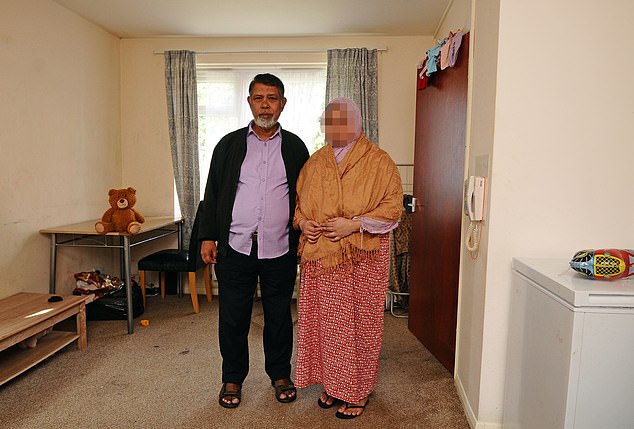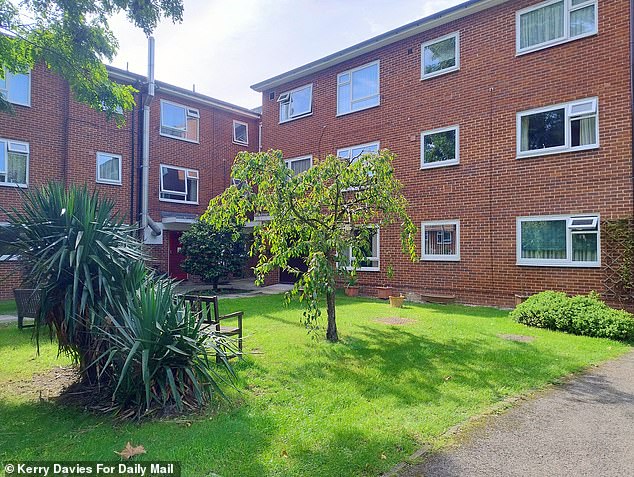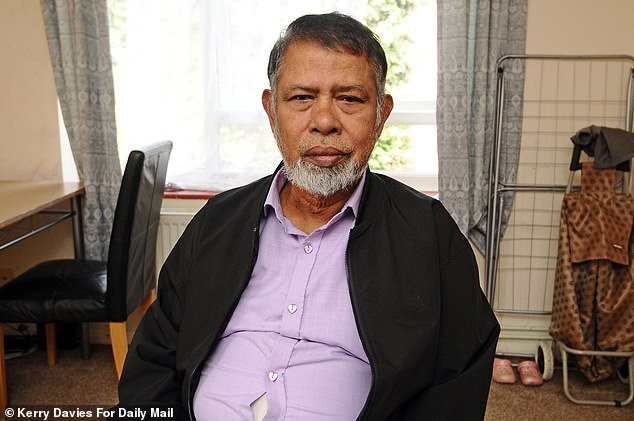David Smith Court is a housing complex in the suburbs of Reading. One of the five red-brick blocks consists solely of retirement flats with communal lounge and dining area, laundry room, hairdressing salon and gardens (where residents can opt to look after their own patch).
Many of those who live here are in their 70s, 80s, even 90s. So a more unlikely setting for controversy you would be hard-pressed to find.
Yet, as improbable as it may seem, the same frustration and anger fuelling much of the social unrest around Britain is being mirrored, in microcosm, in this genteel Home Counties retreat for the elderly.
The fact that such discontent has spread to David Smith Court at all is in itself, perhaps, a powerful illustration of how much of a mess the country is in.
And, once again, the focus of attention is a migrant.
Shahidul Haque, 59, a twice married father of nine from Bangladesh, arrived in the block in July last year.
Five months later, unbeknown to landlords Southern Housing, owners of the site, he moved his second wife, 28-year-old Jakia Sultana Monni and their twin three-year-old daughters into the one-bedroom flat.
Not surprisingly, because this is retirement accommodation, there is a strict minimum age requirement for residency of 55.

Shahidul Haque (left) moved his 28-year-old wife and their twin three-year-old daughters into the one bedroom flat in David Smith Court

The housing complex (above) in the suburb of Reading consists solely of retirement flats with communal lounge and dining area, as well as a laundry room, hairdressing salon and gardens
The introduction of Mr Haque’s young family, breaking all the rules of the tenancy agreement in the process, had an immediate impact on the lives of nearly everyone in the three-storey building: the sound of the youngsters screaming became an almost daily occurrence, corridors turned into playgrounds, the emergency pull cord was misused, and generally ‘rambunctious’ behaviour was the order of the day.
‘Before they arrived it was peaceful, now it isn’t,’ is how one resident summed up the situation.
None of this is the fault of the children in question. Nevertheless, after a meeting with other occupants, the management asked the family to leave because, they said, they had become a ‘source of excess noise levels and anti-social behaviour’ which is ‘negatively affecting other residents’.
Mr Haque refused to do so – presumably acting on legal advice – until somewhere bigger is found for them to live.
The upshot is that court proceedings have begun to evict them. Those are the bare bones of the story.
Here, though, is what really grates with many ordinary people: Mr Haque claims – or rather his barrister is claiming (yes, he has a barrister from a high-powered London chambers) – that turfing them out would breach Article 8 of the European Convention on Human Rights (ECHR), which protects the right to family life.
Article 8 has been ruthlessly exploited by lawyers making money out of legal aid to thwart deportations successfully, including that of an Albanian criminal, partly on the grounds that his son would not eat chicken nuggets from outside the UK, and a Pakistani paedophile allowed to remain in the UK because being removed, it was argued, would be ‘unduly harsh’ on his two toddler sons.
They are among the most notorious rulings. There are many more. Article 8 is now threatening – irony of ironies – to wreck Labour’s ‘one-in, one out’ policy to combat the small-boat migrant crisis.
Gone largely unreported is that the tactic is also being employed, up and down the country, as a defence against eviction. Hence the reason Shahidul Haque and his family are, for the foreseeable future at least, still ensconced in David Smith Court.
Local councillors have accused Mr Haque of ‘gaming the system.’ Having met him this week, I doubt he is capable of this, not without help, anyway.
He is a softly-spoken individual who struggles to make himself understood in English and appeared vulnerable and in a state of some confusion and bewilderment about the row he has provoked.
None of this, though, should distract anyone from the all-too familiar issues at the heart of this case. Mr Haque’s court battle is adding to the bill he has already cost the taxpayer.

Mr Haque’s barrister Isabel Bertschinger (above) is claiming that turfing the family out would breach Article 8 of the European Convention on Human Rights
It is not being unkind to say this – just a statement of fact at a time when the welfare state is ballooning.
He receives benefits for depression and sleep apnoea and is believed to have done so for a considerable time. The couple receive child benefits for their daughters (who were born in Bangladesh), free nursery provision, and legal aid, it is thought, to fight the eviction.
Mr Haque has been in the country since 1997 when he was recruited to work in a restaurant in east London. Thousands of employment permits have been approved down the years for Bangladeshi waiters and chefs, especially in Brick Lane, popularly known as ‘Banglatown’.
He was then married to his first wife. They had seven children together. She lives in a terraced house in Plaistow, east London, with a number of their children, most, if not all, of whom are now adults.
The door was answered by one of her sons when we called. ‘My father got re-married,’ he said. ‘We do not speak to him. We have no communication, nothing. That’s been the situation for three of four years.’
Asked why, he replied: ‘Because he left us.’
Mr Haque became homeless for a period after his divorce and was given social housing in the area before moving to Berkshire.
He must have found the money, despite being on benefits, to make a number of trips back and forth to Bangladesh, first to marry Jakia Sultana Monni – something he confirmed to me when I caught up with him outside his flat this week – and then he fathered his daughters there.
‘They were born in Bangladesh,’ he said.
His application for them to join him in the UK was made last October and they arrived that December.
At Reading County Court, his barrister Isabel Bertschinger argued in a written statement that the terms and conditions of the tenancy agreement were ‘never explained’ to Mr Haque, who is from the Sylhet region of Bangladesh, ‘via a Sylheti interpreter or translated into Sylheti’ and he therefore failed to understand them.
Yet – English or no English – Mr Haque, presumably with help, managed successfully to negotiate the process to bring his family into the country, including a spousal visa for his wife.
Applicants must answer detailed questions and submit supporting evidence to the Home Office across multiple categories, including information about their relationship, finances and accommodation.
The same help doesn’t seem to have been available when he completed the less complicated paperwork for the flat, which, aside from the age stipulation, informs all new arrivals that they ‘should not allow the property to become overcrowded and to notify us if more than the number of people stated in the Particulars of Tenancy are living at the property’.
How did Mr Haque come to be represented by Ms Bertschinger in the first place? If I interpreted his reply correctly, he said someone had given him a telephone number to ring and that he didn’t pay for her services. ‘No, no, no,’ he explained, ‘I’m on benefits.’
Ms Bertschinger works out of One Pump Court, Middle Temple, which prominently displays a ‘Black Lives Matter’ banner on its website. She was a member of the Human Rights Lawyers Association’s Young Lawyers Committee before starting her pupillage and has extensive experience of working with organisations such as Liberty and Bail For Immigration Detainees.

Local councillors have accused Mr Haque (above) of ‘gaming the system’ amid the saga
Previously, she was a paralegal in the human rights department of law firm Leigh Day, which was accused, and subsequently cleared, of improperly pursuing murder and torture claims against British troops in Iraq.
Ms Bertschinger is undoubtedly a fine advocate and, like all lawyers, acts on the instructions of her client.
Nevertheless, she represents an arm of the legal profession blamed by Home Secretary Shabana Mahmood for ‘vexatious, last-minute’ challenges which resulted in one of the first small-boat migrants targeted for removal under Labour’s new deal with France winning a 14-day reprieve, while former Conservative Home Secretary Priti Patel denounced them as ‘Lefty lawyers’.
The controversy surrounding Mr Haque has been heightened because official figures show that the number of homeless people in Reading surged by nearly a fifth (18 per cent) in the first quarter of 2025 and at the end of March, 402 households – three-quarters (299) with children – in the town were using temporary accommodation.
‘I can completely understand why people are livid,’ said Conservative councillor Isobel Ballsdon. ‘It appears very much like he has jumped the queue ahead of people who have lived here all their lives.’
In the retirement wing of David Smith Court, divided into around 40 studio and one-bedroom flats, there is sympathy for Mr Haque’s children – their apartment, it is true, is unsuitable for a family of four – but also annoyance at the problems they are now facing.
‘You can hear the girls screaming and someone telling them to shut up at the top of their voice,’ said former mechanic Derek Cox, 77. ‘It’s almost every night. I do feel aggrieved, especially with the noise, and have had arguments with the management about it.’ Tricia Hawkes, 86, who has lived in the block for ten years and uses a wheelchair, feels sorry for the twins but said: ‘We are all elderly here and there are a lot of people who are very, very unsteady on their feet, so if they bump into them running round the corner, you are likely to go flying.
‘The other day I was being pushed in my wheelchair and was about to get in the lift when one of the children ran in front of me and I had to be yanked back.
‘Also, if they are going to nursery [they are] they will be picking up all sorts of ailments and if they pass it on to someone here, it could be quite worrying.’
Other residents did not wish to give their names but one declared angrily: ‘Frankly, it’s a disgrace. It’s one rule for some and another for everyone else. Who is paying for the lawyer? It’s madness.’
The case, says councillor Ballsdon, ‘raises so many questions’. ‘Generally speaking, you need to have lived in the area for at least three years or have worked here or have family connections in Berkshire,’ she said.
‘It’s really a question of fairness and justice for people who live here and work here all their lives.’
She wanted to know how he afforded flights to and from Bangladesh over the years.
But at the heart of this controversy is Article 8. The Government, declared Attorney General Lord Hermer last week, will now ‘leave no stone unturned’ to stop the ECHR being abused.
Don’t hold your breath.
- Additional reporting: Tim Stewart and Isaac Crowson












